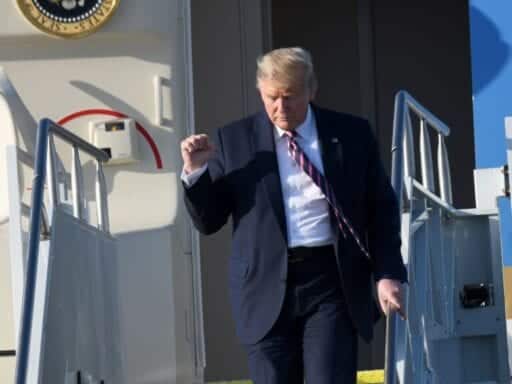They’re aimed at the very sorts of obstruction of justice and financial crimes he’s been implicated in.
The notion that arguably the most personally corrupt president in American history has good-faith concerns about corruption has always been absurd. But whatever shred of plausibility it had was dealt a death blow on Tuesday when President Donald Trump pardoned or commuted the sentences of a veritable who’s who of corrupt public figures.
Trump commuted the sentence of former Illinois Gov. Rod Blagojevich (D), who was convicted of fraud and conspiracy charges related to his efforts to basically sell a US Senate seat. He pardoned former New York City Police Commissioner Bernard Kerik, who pleaded guilty to tax fraud and lying to investigators. He pardoned billionaire financier Michael Milken, who pleaded guilty to insider trading. He commuted the sentence of Judith Negron, who, according to the Justice Department, “masterminded one of the largest fraud schemes ever prosecuted by the Medicare Fraud Strike Force.” Also receiving a pardon was former San Francisco 49ers owner Eddie DeBartolo Jr., who was convicted of failing to report a bribe.
Those names highlighted the list of 11 people who were suddenly granted pardons or commutations. Each of them, with the exception of two women whose sentences for drug-related crimes were commuted, were implicated in corrupt dealings.
Mother Jones ticks through the rest of the pardon/commutation list:
Ariel Friedler hacked into his competitors’ computers. Paul Pogue filed false income tax statements. David Safavian is a Republican lawyer who was convicted of perjury in connection with the Abramoff corruption scandal. Angela Stanton “spent time in Georgia prisons for things like felony embezzlement, theft and fraud” but since her release in 2005 has become a best-selling author and the creator of Reclaim It Albany.
The backdrop to all of this is Trump’s recently completed impeachment trial — one stemming from the president getting caught trying to leverage congressionally approved military aid to Ukraine into politically motived investigations of the Bidens.
Trump tried to justify his actions by arguing that as president, “I have an absolute right, perhaps even a duty, to investigate, or have investigated, CORRUPTION.” That logic was echoed by his legal team during the trial. But it was belied by the fact that a top Defense Department official told Congress last May that Ukraine had made good enough progress on anti-corruption efforts to merit the aid — not to mention the glaring hypocrisy stemming Trump’s refusal to divest from his business, one that enables foreign governments, corporations, and US politicians to curry favor with him by patronizing his properties and directly enriching him.
Then, in the hours following Trump’s string of pardons and commutations, the Daily Beast reported that family members of one of the men Trump pardoned, Paul Pogue, donated lavishly to his fundraising committee and campaign in the months leading up to the pardon — a chain of events that appears to be about as corrupt as it gets.
From Justin Baragona and Asawin Suesbsaeng’s report:
According to FEC filings, Pogue’s family has donated hundreds of thousands of dollars in direct contributions and in-kind air travel to the Trump Victory Committee. Beginning in August 2019, Ben Pogue—CEO of Pogue Construction and son of Paul Pogue—and his wife Ashleigh made over $200,000 in contributions to the campaign.
In August alone, Ben Pogue donated $85,000 to Trump Victory while Ashleigh Pogue contributed $50,000 that month. The following month, Ben Pogue made an in-kind air travel contribution of $75,404.40. The couple also made several large donations to the Republican National Committee and each donated $5,600 to Donald Trump for President Inc.
Trump, of course, is not the first president to use the pardon power in politically questionable ways. George HW Bush pardoned Iran-Contra felons, and Bill Clinton pardoned fugitive billionaire Marc Rich on his last day in office.
But in those cases Bush and Clinton at least pretended to have principled reasons for the pardons. In contrast, the New York Times’ Maggie Haberman and Michael Shear reported that Trump didn’t follow Justice Department vetting process before making the announcements, which they described as “mostly aimed at wiping clean the slates of rich, powerful and well-connected white men.” And statements released by the White House listed a number of Fox News personalities as character witnesses.
Meanwhile, in comments to reporters, Trump erased the DOJ by describing himself as “the chief law enforcement officer of the country.” He went on to suggest that any prosecution in which former FBI director James Comey was even indirectly involved is fair game for pardons.
Trump on commuting sentence for Blagojevich: “It was a prosecution by the same people — Comey, Fitzpatrick — the same group.” pic.twitter.com/gXigT20Fdc
— Aaron Rupar (@atrupar) February 18, 2020
In short, the true purpose of Trump’s pardons and commutations appears to be threefold: consolidating power; dismissing the sort of obstruction of justice and financial crimes he’s been implicated in; and laying the groundwork for pardoning or commuting the sentence of longtime confidante Roger Stone, who’s scheduled to be sentenced on Thursday.
The events of Tuesday shouldn’t have been necessary to establish that Trump doesn’t actually have good-faith concerns about corruption. Tellingly, however, when Trump and his legal team argued just that during the impeachment process, Republicans such as Ted Cruz pretended to buy it with comments like, “A president is always justified, and in fact has a responsibility, to investigate credible accusations of corruption.” Those remarks are aging worse than ever now.
The news moves fast. To stay updated, follow Aaron Rupar on Twitter, and read more of Vox’s policy and politics coverage.
Author: Aaron Rupar
Read More



